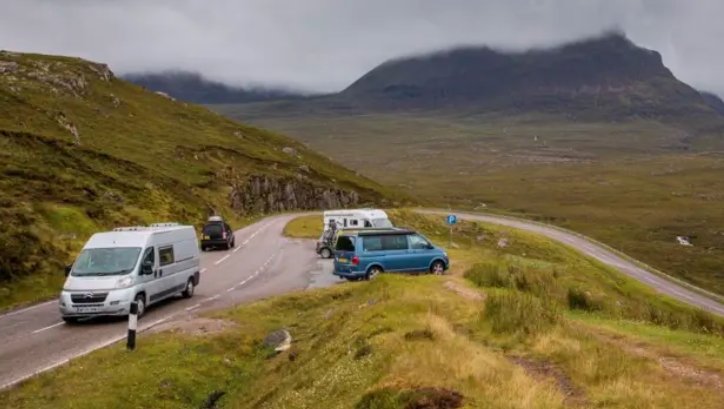A wave of eco-conscious travel is sweeping across the Scottish Highlands, as 3,000 tourists sign a pledge to travel responsibly on the iconic North Coast 500 route. Locals are hopeful this growing movement can ease the burden on their communities—without slowing the tourist boom.
Scenic Beauty, But at What Cost?
The North Coast 500—or NC500 for short—is no hidden gem anymore. Stretching 830 km around the Highlands, starting and ending in Inverness, this rugged route is on every road-tripper’s dream list. And that’s both a blessing and a bit of a headache.
Local businesses have welcomed the economic boost. But some Highland residents say they’re feeling overwhelmed. Traffic jams on single-track roads, wild camping mishaps, overflowing bins—none of it’s fun to deal with.
So in October 2024, North Coast 500 Ltd launched a new pledge. A tourist code of conduct, basically. Visitors are asked to respect the land, the locals, and the law. And now, over 3,000 people have signed on.

What Exactly Are Tourists Promising to Do?
The pledge is surprisingly practical. It doesn’t guilt-trip tourists—it gives them clear steps to follow. That’s probably why it’s catching on.
Here’s a quick look at what’s in the pledge:
-
Waste management: Use bins. Don’t chuck litter. Recycle if possible.
-
Smart parking: No more cars dumped on verges or blocking drives.
-
Shop local: Skip the chains. Buy from small businesses.
-
Keep it quiet: Especially at night. Especially in rural areas.
-
Follow Scotland’s Outdoor Access Code: Hike, camp, and explore with care.
-
Drive safely: The NC500 isn’t a racetrack. Some roads are barely wide enough for a Mini.
Driving etiquette, in particular, is a major part of the campaign. Those unfamiliar with single-track roads often ignore passing places or cause bottlenecks. Locals say it’s been a recurring problem every summer.
Tourists Are Doing More Than Just Signing Papers
For many, the pledge isn’t just a box to tick. It’s sparked real action. According to figures from North Coast 500 Ltd:
-
13% joined a beach cleanup.
-
12% donated to Highland-based food banks or charities.
-
91% supported local businesses directly.
-
83% shared tips about sustainable travel online or in person.
That’s more than lip service. It’s proof that many visitors actually want to be part of the solution.
The Local Angle: Finally, Tourists Are Listening
One of the most important things about this pledge? It wasn’t drafted behind closed doors. Locals were involved right from the start.
People who live along the NC500—shopkeepers, crofters, tour guides, retirees—helped shape the language. Their input wasn’t just welcomed; it was essential.
David Richardson, Development Manager for North Coast 500 Ltd, said the feedback loop has been eye-opening. “We heard stories from folks who’ve had campers parked outside their driveways or found human waste in their fields,” he said. “But we also met visitors who had no idea what they were doing wrong—and were desperate to get it right.”
That’s where the pledge comes in. It’s not about rules for the sake of rules. It’s about building mutual respect.
A Digital Boost: Education, Not Enforcement
So how do you make sure people actually follow through after signing? Well, there’s an app for that—sort of.
North Coast 500 Ltd has launched a digital platform packed with info. And not the boring kind.
Want to know how to spot a puffin without disturbing its nest? Or how to wild camp legally in Sutherland? Or maybe how to reverse safely into a passing place on a hairpin bend?
There’s a page for that.
The point is to empower people, not police them. The more you know, the less likely you are to be that tourist.
One paragraph. Just one. It’s needed here.
The Bigger Picture: Money, Mayhem, and the Middle Ground
Let’s not pretend tourism is all sunshine and profits. Sure, the NC500 has brought in millions—but it’s also stretched public services thin.
Highland Council has flagged issues around:
-
Road wear and tear
-
Emergency service access
-
Seasonal overcrowding
-
Public toilets running out of funds
The pledge won’t solve all of that overnight. But it’s a step toward balance.
Here’s a quick breakdown of the numbers that show why the balance matters:
| Impact Area | Before NC500 (2014) | After NC500 Launch (2024) |
|---|---|---|
| Annual Visitors | ~100,000 | ~500,000+ |
| Local Spend (est.) | £12M | £36M+ |
| Reported Incidents* | 30 | 160+ |
*includes road issues, noise complaints, and wild camping concerns
Some communities have even floated the idea of capping visitors during peak seasons, though nothing official has been proposed yet.
Saving More Than Just the View
It’s easy to look at the Highlands and see only sweeping cliffs, sea stacks, and winding lochs. But there’s culture here too. And it’s under pressure.
Locals worry about losing more than landscapes. Gaelic language use is declining. Traditional music sessions are getting harder to find. Even the pace of life is shifting.
The pledge is quietly helping push back against that. Not by freezing time—but by nudging tourists to show up with curiosity instead of entitlement.
One sentence here. A breather.
Whether it’s respecting crofting land or attending a ceilidh without filming every second, the little things matter.


















